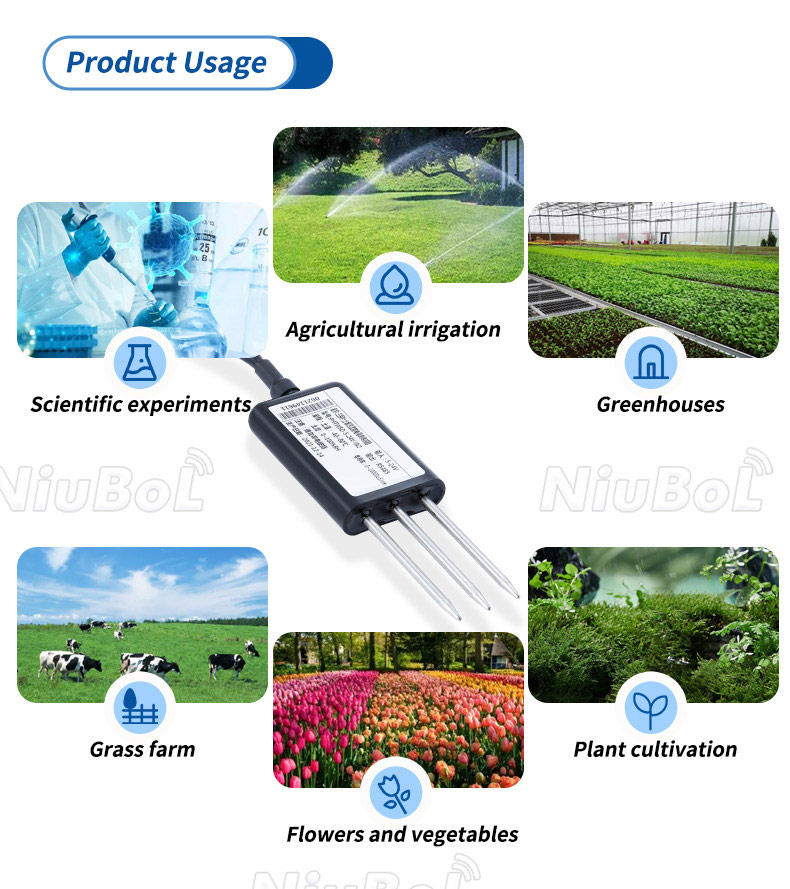

— Blogs —
—Products—
 Consumer hotline +8618073152920
Consumer hotline +8618073152920 WhatsApp:+8615367865107
Address:Room 102, District D, Houhu Industrial Park, Yuelu District, Changsha City, Hunan Province, China
Product knowledge
Time:2024-05-03 09:46:24 Popularity:303
The importance of soil moisture for spring planting cannot be overstated. Soil moisture refers to the condition of water content in the soil, which is an important indicator of soil moisture condition and crop growth. In the spring plowing period, the soil moisture is directly related to the growth and yield of crops.
First of all, suitable soil moisture is conducive to the germination and growth of crops. After sowing in the spring, moisture in the soil is an important condition for seed germination and seedling growth. If the soil moisture is suitable, the seeds can germinate successfully and the seedlings can grow vigorously. On the contrary, if there is not enough or too much soil moisture, it will affect the germination rate of seeds and the growth of seedlings.
Secondly, good soil moisture helps the development of the root system of crops. The root system is an important organ for crops to absorb water and nutrients, and only with a well-developed root system can crops thrive. During the spring plowing period, if the soil moisture is suitable, the root system of crops can be fully developed, so as to absorb more water and nutrients, and provide sufficient protection for the growth of crops.
In addition, suitable soil moisture also helps to improve the yield and quality of crops. In the process of crop growth, if the soil moisture is suitable, the photosynthesis and respiration of crops can be carried out normally, thus promoting the growth and development of crops. At the same time, suitable soil moisture can also improve the disease resistance and resilience of crops, reduce the occurrence of pests and diseases, and improve the yield and quality of crops.
The impact of soil moisture on spring plowing is specifically manifested in the following aspects:
1. Seed germination and seedling growth: when soil moisture is suitable, there is sufficient water in the soil, which is favorable to seed germination and seedling growth. Seeds need to absorb a certain amount of water to activate their internal physiological activities in the process of germination, and seedling growth also needs a stable supply of water to ensure its normal development.
2. Crop root development: Proper soil moisture is essential for crop root development. A good soil moisture environment helps the root system to extend downward, expanding the root range and thus absorbing water and nutrients from the soil more effectively. This has a significant impact on crop growth and yield formation.
3. Water utilization efficiency: Suitable soil moisture can improve the water utilization efficiency of crops. When soil moisture is moderate, crops can absorb water from the soil through transpiration and convert it into bioenergy to promote crop growth. If the soil moisture is too dry or too wet, it will affect the water utilization efficiency of the crop, which in turn will affect the yield.
4. Pests and diseases: Soil moisture also has an effect on the occurrence of pests and diseases. Excessively wet soil conditions can easily harbor bacteria and viruses, increasing the risk of crop diseases. While appropriate soil moisture can improve the disease resistance of crops and reduce the occurrence of pests and diseases.
5. Crop yield and quality: Soil moisture is one of the most important factors affecting crop yield and quality. During spring plowing, if the soil moisture is suitable, the growth and development of crops will be ensured, which will increase the yield and quality. On the contrary, if soil moisture is poor, crop growth and development will be limited, resulting in lower yields and lower quality.

In conclusion, the importance of soil moisture for spring planting is that it is directly related to the growth and yield of crops. Specifically, if soil moisture is suitable, farmers can sow seeds at the right time to reduce crop growth problems caused by insufficient or excessive moisture; at the same time, water and fertilizer management can be reasonably arranged according to soil moisture to improve the efficiency of water and fertilizer utilization; in addition, suitable soil moisture can help to improve the resistance of crops to diseases and reduce the occurrence of pests and diseases.
Therefore, during the spring plowing period, farmers should pay close attention to changes in soil moisture and take corresponding measures to ensure the normal growth and development of crops. Attention also needs to be paid to preventing the impact of meteorological disasters such as spring drought and spring flooding on soil moisture.
Prev:Main functions and application scenarios of automatic weather station
Next:Major equipment required for the construction of weather stations
Related recommendations
Sensors & Weather Stations Catalog
Agriculture Sensors and Weather Stations Catalog-NiuBoL.pdf
Weather Stations Catalog-NiuBoL.pdf
Related products
 Combined air temperature and relative humidity sensor
Combined air temperature and relative humidity sensor Soil Moisture Temperature sensor for irrigation
Soil Moisture Temperature sensor for irrigation Soil pH sensor RS485 soil Testing instrument soil ph meter for agriculture
Soil pH sensor RS485 soil Testing instrument soil ph meter for agriculture Wind Speed sensor Output Modbus/RS485/Analog/0-5V/4-20mA
Wind Speed sensor Output Modbus/RS485/Analog/0-5V/4-20mA Tipping bucket rain gauge for weather monitoring auto rainfall sensor RS485/Outdoor/stainless steel
Tipping bucket rain gauge for weather monitoring auto rainfall sensor RS485/Outdoor/stainless steel Pyranometer Solar Radiation Sensor 4-20mA/RS485
Pyranometer Solar Radiation Sensor 4-20mA/RS485
Screenshot, WhatsApp to identify the QR code
WhatsApp number:+8615367865107
(Click on WhatsApp to copy and add friends)